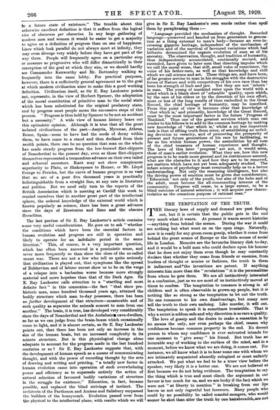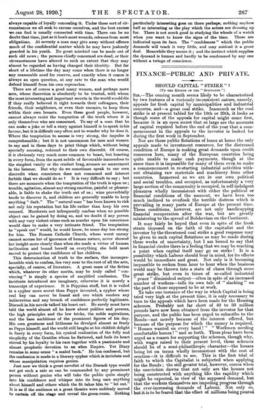THE TEMPTATION OF THE TRUTH.
THE literary laws of supply and demand are past finding out, but it is certain that the public gets in the end very much what it wants. At present it wants secret histories —anything from behind the scenes. During the war it could see nothing but what went on on the open stage. Naturally, now it is ready for any green-room-gossip, whether it come from behind the great scenes of Europe or the little scenes of social life in London. Memoirs are the favourite literary dish to-day, and it would be a bold man who could declare upon his honour that he does not enjoy them even though he may constantly declare that whether they come from friends or enemies, from leaders of thought or armies or fashions, the truth in them is indiscreet and •the inventions are patent. If anything interests him more than the " revelations " it is the personalities from whom he gets them. We are all instinctively interested in a confession, just as we are most of us instinctively moved at times to confess. The temptation to romance is strong in children and is often observable in grown-up people, but it is nothing like so strong as the temptation to let out the truth. No one romances to his own disadvantage, but many men tell the truth to their own undoing. Like murder, it will out. The temptation to speak it is sometimes irresistible. That is why a secret is seldom safe and why discretion is so rare a quality.
The love of gossip and the desire to make a •sensation is by no means the only, nor even perhaps the chief, reason why confidences become common property in the end. No decent person to whom any confidence is ever entrusted intends for one moment to " give away " his friend. But truth has an incurable way of working to the surface of the mind, and in a moment, before we know what we are doing, it comes out. For instance, we all know what it is to hear some one with whom we are intimately acquainted absurdly eulogized or moat unfairly attacked. We put what we feel to be a truer view before the speaker, very likely it is a better one. We are not believed at first because we do not bring evidence. The temptation to say the thing which is true and must clinch the argument in our favour is too much for us, and we are lucky if the fact which we were not " at liberty to mention " in breaking from our lips leaves us not only regretful but forsworn. Many people who could by no possibility be called scandal=mongers, who would sooner be shot than alter the truth by one hairebreadth,are not
always capable of loyally concealing it. Under these sort of cir- cumstances we all seek to excuse ourselves, and the best excuse we can find is usually connected with time. There can be no doubt that time, just as it heals most wounds, releases from most obligations. At seventy a man may give away without offence much of the confidential matter which he may have jealously guarded in his youth. No great mischief can be made out of such old news ; the persons chiefly concerned are dead, or their circumstances have altered to such an extent that they may almost be regarded as having changed their identity. But far short of a lifetime the day may come when there is no longer any reasonable need for reserve, and exactly when it comes is always an open question, at any rate to the man who would defend himself from his own reproaches.
There are of course a good many women, and perhaps more men, whose discretion is absolutely to be trusted, with whom the most interesting and important secrets in the world would die if they really believed it right towards their colleagues, their friends, their neighbours, or even their enemies, to keep them within their own breasts. Even these good people, however, cannot always resist the temptation of the truth where it is only themselves who are concerned. To say of a man that he can make a joke or tell a story against himself is to speak in his favour, but it is difficult very often not to wonder why he does it. Where the temptation to amuse is-very strong, the impulse is comprehensible; but it is not uncommon for men and women to say and in these days to print things which, without being specially amusing, redound to their own discredit. Of course, it is obviously very much more common to boast, but boasting in every form, from the most subtle of favourable innuendoes to the simplest vanity or the crudest brag, arouses no amazement in the listener. But why do we sometimes speak to our own discredit when conscience does not command and interest forbids that we should do so ? It is very difficult to say ; but there are moments when the temptation of the truth is upon us ; trouble, agitation, almost any strong emotion, painful or pleasur- able, is liable to shake the truth out of us ; wine proverbially tends to discover it, and children are generally unable to keep anything " dark." The " natural man " has been known to risk not only his reputation but his life rather than keep his own counsel. Murderers not infrequently confess when no possible object can be gained by doing so, and we doubt if any person with any very violent crime such as murder upon his conscience would dare to make a very intimate friend. The temptation to "speak out" would, he would know, be some day too strong for him. The Roman Catholic Church, whose worst enemy cannot accuse her of ignorance of human nature, never showed her insight more clearly than when she made a virtue of human inclination and bound herself on everything she- held most sacred to protect the confidence of her children.
This determination of truth to the surface, this incompre- hensible wish to confess, lies very near to the xoot of alll the arts, specially, of course, of literature. A great mass of the fiction which, whatever its other merits, may be truly called " con- vincing" is simply a species of amplified confession. The incidents introduced are imaginary, otherwise it is merely a transcript of experience. It is Pepysian stuff, but it is veiled in a cypher more secret than Pepys invented, a cypher whose real key can never be found and one which renders any indiscretion and any breach of confidence perfectly legitimate. Disraeli in his novels talked his heart out. He surely must have told the world almost all he knew about politics and persons, the high principles and the low tricks, the noble aspirations, and the base ambitions of the prominent figures of his day. His own greatness and littleness he divulged almost as freely as Pepys himself, and the world still laughs at his childish delight in finery in every form, his cynical realization of the folly and simplicity of the Gentiles whom he flattered, and feels its heart stirred by his loyalty to his race together with a passionate and almost prophetic devotion to an alien Empire. Yet Dizzy remains in some sense " a sealed book." He has confessed, but the confession is made in a literary cypher which is inviolate and whose manipulation requires genius.
Just now we think a great novelist of the Disraeli type would not get such a sale as can be commanded by any prominent person without genius who will take the public quite simply into his confidence and whisper into its long ears anything about himself and, others which the fit _takes him to " let out." It is a& if the audience at a great theatre were suddenly moved to curtain off the stage and reveal the green-room. Nothing particularly interesting goes on there perhaps, nothing anyhow half so interesting as the play which the actors are dressing up for. There is not much good in studying the wheels of a watch when you want to know the signs of the time. Those are indicated upon its face. The " confidences " which the public demands will teach it very little, and may mislead it a great deal. Meanwhile they amuse it ; and the instinct which supplies the demand is human and hardly to be condemned by any one without a twinge of conscience.



































 Previous page
Previous page